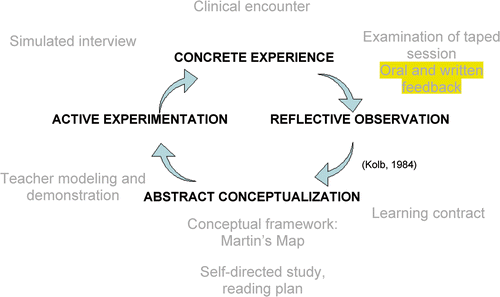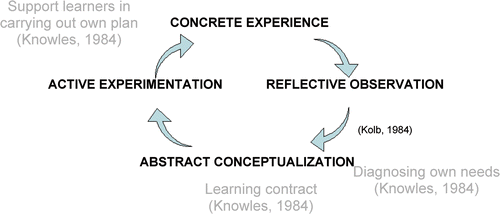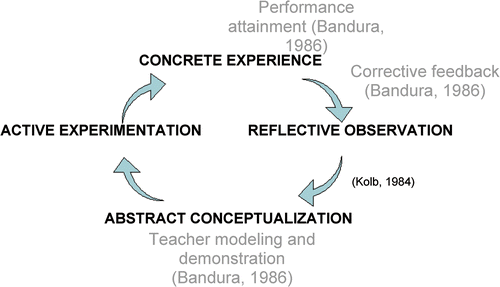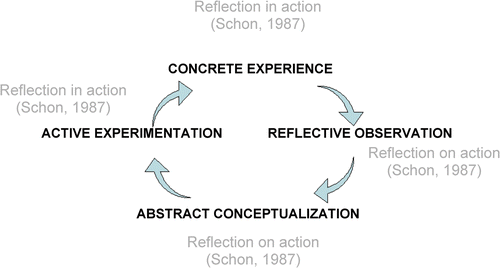Abstract
Problem: Residents requiring remediation are often deficient in communication skills, namely clinical interviewing skills. Residents have to digest large amounts of knowledge, and then apply it in a clinical interview. The patient-centered approach, as demonstrated in the Calgary-Cambridge model and Martin's Map, can be difficult to teach. Before implementing a remediation curriculum, the theoretical educational underpinnings must be sound; curriculum evaluation is often expensive. Before establishing metrics for curriculum evaluation, a starting point is to perform a mental experiment to test theoretical adherence.
Methods: This article describes an experiential remedial curriculum for communication skills. Educational theories of Kolb, Knowles, Bandura, and Bloom are used to design the curriculum into theory-based design components.
Conclusions: Kolb's experiential cycle models the natural sequence of experiencing, teaching, and learning interviewing skills. A curriculum structured around this cycle has multiple intercalations with the above educational theories. The design is strengthened by appropriately timed use of education strategies such as learning contracts, taped interviews, simulations, structured reflection, and teacher role modeling. Importantly, it also models the form of the clinical interview format desired. Through understanding and application of contemporary educational theories, a program to remediate interviewing skills can increase its potential for success.
Introduction
Residents identified as needing remediation are a population at risk. Coming from a self-selected group of individuals who are highly motivated and usually highly performing, they experience considerable stress being told that they are no longer performing adequately (Zuzelo Citation2000). Of even greater import are the potential ramifications of future patient care of inadequately remediated residents.
It has been reported by staff working with poorly performing residents that these trainees are often deficient in communication skills, namely clinical interviewing skills (Wilkinson and Harris Citation2002). Residents have to digest and absorb a large body of knowledge, as well as to apply it appropriately within the context of a clinical interview. The context of the clinical interview in the current medical professional milieu is that of the patient-centered approach. This approach can be difficult to teach (Martin Citation2003).
Remediation of communication, especially while working with such a challenging group can be a daunting task. A curriculum solidly based on well-established adult educational principles described in this article is ideal.
Educational principles
A successful curriculum for these residents in clinical interviewing skills will ideally adhere to key educational theories and curriculum design principles as follows. Before implementing or modifying a remediation curriculum, the theoretical underpinnings of the project must be sound; curriculum evaluation is often expensive, and reducing the number of iterations and cycles required in a quality improvement process is desirable. Before establishing hard metrics for curriculum evaluation, a good starting point is to perform a mental experiment to test its theoretical adherence and robustness.
Kolb
Kolb's model of experiential learning (Kolb Citation1984) visualizes learning as a cycle. In the model, Kolb posits that learning from experience can be visualized as a cycle. The cycle is composed of four continuous and contiguous stages, moving from Experience through Reflection and Conceptualizing to Action and returning to Experience (). Each stage follows the other, and thus successful movement through the cycle requires one to pay adequate attention to stages preceding and proceeding. After Experience (also termed Concrete Experience), the trainee Reflects. To understand and describe that experience, the trainee must then derive from it some general rules or theories (i.e., Conceptualizing or Abstract Conceptualizing). This conceptualizing allows the trainee to construct means by which to modify the next occurrence of a similar experience through Action (sometimes also termed Active Experimentation). The loop is then closed with a return to Experience.
Kolb's work has also furthered understanding into different learning styles; different individuals have varying aptitudes for different stages of the learning cycle. Since the stages follow each other, areas of weakness based on learning style must be buttressed. Examination of similarities between educational theories can help identify and build up a set of tools for addressing the different stages. And while different educational theories have varying focuses, a lens directed at similarities can identify critical theoretical elements.
Kolb and Knowles
There are significant intercalations of Knowles’ andragogical assumptions and principles () (Knowles Citation1984) with Kolb's model of experiential learning (Kolb Citation1984). In Kolb's model, during the Reflection stage (), the learner can diagnose his/her own needs (Knowles, Citation1984) – the adult learner is independent and self-directing (). During the stage of Abstract Conceptualization (), a learning contract can be constructed with the learner formulating his/her own objectives (Knowles Citation1984) – the adult learner has a background of experiences for learning and also desired problem centered approaches (). In both the Active Experimentation and Concrete Experience stages (), the learner can be supported to carry out his/her own plans (Knowles Citation1984) – the adult learner will seek out education experiences that integrate with everyday life (). Kolb's model of learning overlaps synergistically with many other educational theories.
Table 1. Knowles’ assumptions of adult learning
Kolb and Bandura
If properly conceived, the cycle of experiential learning can also be used to promote self-efficacy (). The overlap of Kolb's cycle and Bandura's theory of self-efficacy (Bandura, Citation1986) can occur at several different stages. Corrective feedback during the Reflective Observation stage can act as verbal persuasion (Bandura Citation1986; Faustinella et al. Citation2004). Teacher modeling (Bandura Citation1986) and demonstration (i.e., observations of others) occurs during the Abstract Conceptualization stage. Finally, performance attainment (Bandura Citation1986) occurs as the learner re-enters the experiential learning cycle with a return to the Concrete Experience stage.
Kolb and Schön
Again, as with the works of Knowles and Bandura, commonalities are found between the writings of Schön on reflective practice (Schön Citation1987) and Kolb's cycle of experiential learning. ‘Reflection in action’ occurs immediately, drawing from past experiences and reasoning to deal with a situation as it transpires. Alternately, ‘reflection on action’ occurs later, with the learner thinking back on what happened, how it happened and implications this might have for the future. ‘Reflection in action’ occurs during the Concrete Experience stage () and ‘reflection on action’ occurs during the Abstract Conceptualization stage ().
The remedial curriculum
Complete curricular design requires proper treatment of objectives, content and teaching, and evaluation methods. Similar to strategy selection and theoretical underpinnings, these elements also greatly influence the success of a curriculum. However, this discourse will focus on the strategy selection aspect of a theory-based curriculum design.
A remediation curriculum for communication can benefit by being based on Kolb's experiential teaching model. In following the previously discussed multiple educational theories, a curriculum might have improved flexibility and responsiveness. How can this theory be translated into application?
Concrete experience
Before entering the cycle, the learner will be encouraged to create a learning contract (Cantillon et al., Citation2003). The Concrete Experience stage is entered with the remedial resident experiencing a clinical encounter (). This clinical encounter will be recorded.
Figure 4. Kolb's model of experiential learning, with some educational activities noted for remedial curriculum in interviewing skills.

Suggested tools: learning contract, direct clinical exposure, video recording.
Reflective observation
Reflective observation occurs with examination of the taped session (). Corrective feedback (Bandura Citation1986) will be provided at this stage to direct improved later performance (Faustinella et al. Citation2004). Written feedback will be structured using the Calgary-Cambridge Model (Kurtz et al. Citation2003).
Suggested tools: dissection of recording, oral feedback, written feedback, self-reflection.
Abstract conceptualization
At this stage (), the trainee will be exposed to the conceptual framework of Martin's Map (Martin Citation2003). This is a conceptual framework that instructs learners on how to take an organized and relevant clinical history (including both the medical history and social history) using a patient-centered approach. The Calgary-Cambridge Model can also be used (Kurtz et al. Citation2003). In addition to both didactic and interactive teachings of the Martin's Map approach, there will also be teacher modeling and demonstration of appropriate interviewing techniques (Bandura Citation1986). The learners will also be guided in some independent study (Dent and Harden Citation2001; Cantillon et al. Citation2003) including the creation of a reading plan.
Suggested tools: Martin's Map, teacher modeling, teacher demonstration, reading plan.
Active experimentation
The active experimentation will take the form of a mock interview of the instructor (), utilizing the conceptual framework that was just taught.
Suggested tool: mock interview simulation.
All of this teaching will occur on a flexible, student-centered one-to-one basis. As Stott and Davis (Stott and Davis Citation1979) and Bloom (Bloom Citation1956) suggest, a ratio of one–to-one, teacher to learner, can often create extraordinary results. While the expense of such a system is quite high, the potential for active learning to occur is also very high, as is the relevance of feedback and modeling behaviors and attitudes (Cantillon et al. Citation2003). The result is considerable efficiency overall. For the small number of students requiring significant timely remediation, such investment of educational resources can be justified.
Each stage of Kolb's experiential model in the proposed remedial curriculum has several possible separate activities. The lessons of each stage, particularly Abstract Conceptualizing, should be given time to take proper root. And thus, the speed at which a trainee can move through the cycle will depend on the intensity of the program. A trainee working under close remediation supervision might be able to complete an iteration of the cycle (and possibly gain some of its benefits) within a week. A trainee receiving remediation supervision once every 2 weeks will take considerably longer time. Difficulty encountered at a certain stage because of varying learning styles would be a further challenge. And certainly, the number of iterations necessary would depend largely on the extent of remediation needed.
In summary, several educational tools and strategies will be employed.
Learning contract
Direct clinical exposure
Video recording of encounters
Examination of taped sessions
Corrective and formative feedback
Didactic teaching of an interviewing conceptual framework
Teacher demonstration and modeling of the framework
Self-directed learning and reading plans
Mentoring
One–to-one teaching ratio
Simulated interview situations.
This summary list of tools is useful in creating a flexible learning environment. But more than simply a collection of tools, the chosen order of their execution can help guide a trainee's development and remediation. Choice of tool needs to reflect the experiential stage of the learner in order to move them properly through the cycle.
The variety of strategies and activities can help create a robust learning environment that can be responsive to the needs of individual learners (Amin and Eng Citation2003). What is more, the educational activities mirror the stages of experiential learning as well as the principles of several learning theories. A supportive learner-centered curriculum parallels and models the patient-centered approach desired from physicians; multiple strategies with reflection and feedback help connect doctor with patient, and help bridge teacher to student.
The different educational activities foster cognitive development; they target various increasing levels of cognitive development as described through Bloom's taxonomy. Basic knowledge and comprehension will be attained through instructor guidance and independent study. Application of this knowledge will be fostered with mock or simulated interviews as well as direct clinical experience. Through the subsequent examination of taped sessions and didactic teaching of the conceptual framework for interviewing, the resident will be encouraged to move into the stages of analysis and synthesis. With the seeds planted with corrective and formative feedback and then fruition effect through the construction of a learning contract, the trainee will be moved into the cognitive task of self-reflection. Similarly, the use of role-playing, role-modeling, video-tape review, and mentoring will address growth within the domain of attitude (Douglas et al. Citation1988). Simulations, instructor demonstrations and further role-modeling, and video-tape review will be used for development in the domain of skills.
Finally, assessment of the trainee will be in both formative and summative formats. As noted previously, supportive corrective feedback (Bandura Citation1986) will be provided after each clinical interview, as well as after every simulated encounter in an iterative manner. This is designed to encourage self-efficacy (Bandura Citation1986) and reflective practice (Schön Citation1987). A system of structured self-evaluation on the part of the trainee will also need to be in place. This directs reflection by resident to foster insight into self-assessment – an integral part of self-directed learning and self-regulation (Hays et al. Citation2002).
Conclusion
Following the educational theories of contemporary adult learning and the principles of curriculum design, a program to remediate trainees’ clinical interviewing skills may increase its potential for success. Kolb's experiential cycle (Kolb Citation1984) models the natural and logical sequence of experiencing, teaching, and learning interviewing skills. It follows that a remedial curriculum structured after this experiential cycle will have multiple intercalations with many important educational theories.
Declaration of interest: The authors report no conflicts of interest. The authors alone are responsible for the content and writing of the article.
Additional information
Notes on contributors
Fok-Han Leung
FOK-HAN LEUNG, MD CCFP MHSc, is an academic family physician at St. Michael's Hospital, University of Toronto. He is interested in clinical communication skills and works extensively with residents with a focus on international medical graduates.
Dawn Martin
DAWN MARTIN, M.Ed PhD, is Assistant Professor and Educational Consultant in the Department of Family and Community Medicine, University of Toronto. She is also Communications Specialist at the Office of Postgraduate Medical Education and works extensively with residents requiring remediation.
Helen Batty
HELEN BATTY, MD, CCFP, M.Ed, FCFP, is Professor and faculty member of the Department of Family and Community Medicine, University of Toronto. She is also the Founding Director for the Department of the Academic Fellowship and the Graduate Studies programs.
References
- Amin Z, Eng KH. Basics in medical education. World Scientific Publishing Co, River Edge, NJ 2003
- Bandura A. Social foundations of thought and action: A social cognitive theory. Prentice-Hall, Englewood Cliffs, NJ 1986
- Bloom BS. Taxonomy of educational objectives, handbook: I. The cognitive domain. David McKay Co Inc, New York, NY 1956
- Cantillon P, Hutchinson L, Wood D. ABC of learning and teaching in medicine. BMJ Publishing Group Ltd, LondonEngland 2003
- Dent JA, Harden RM. A practical guide for medical teachers. Harcourt Publishers, TorontoCanada 2001
- Douglas KC, Hosokawa MC, Lawler FH. A practical guide to clinical teaching in medicine. Springer Publishing Co, New York, NY 1988
- Faustinella F, Orlando PR, Colletti LA, Juneja HS, Perkowski LC. Remediation strategies and students’ clinical performance. Medical Teacher 2004; 26(7)664–665
- Hays RB, Jolly BC, Caldon LYM, McCrorie P, McAvoy PA, McManus IG, Rethans JJ. Is insight important? Measuring capacity to change performance. Med Educ 2002; 36: 965–971
- Knowles M. Andragogy in action. Jossey-Bass, San Francisco, CA 1984
- Kolb DA. Experiential learning: Experience as the source of learning and development. Prentice-Hall, Englewood Cliffs, NJ 1984
- Kurtz S, Silverman J, Benson J, Draper J. Marrying content and process in clinical method teaching: Enhancing the Calgary-Cambridge guides. Acad Med 2003; 78(8)802–809
- Martin D. Martin's Map: A conceptual framework for teaching and learning the medical interview using a patient-centred approach. Med Educ 2003; 37: 1145–1153
- Schön DA. Educating the reflective practitioner: Toward a new design for teaching and learning in the professions. Jossey-Bass, San Francisco, CA 1987
- Stott N, Davis R. The exceptional potential in each primary care consultation. J R Coll Gen Pract 1979; 29: 201–205
- Wilkinson TJ, Harris P. The transition out of medical school – A qualitative study of descriptions of borderline trainee interns. Med Educ 2002; 36: 466–471
- Zuzelo PR. Clinical probation: Supporting the at-risk student. Nurse Educ 2000; 25(5)216–218


